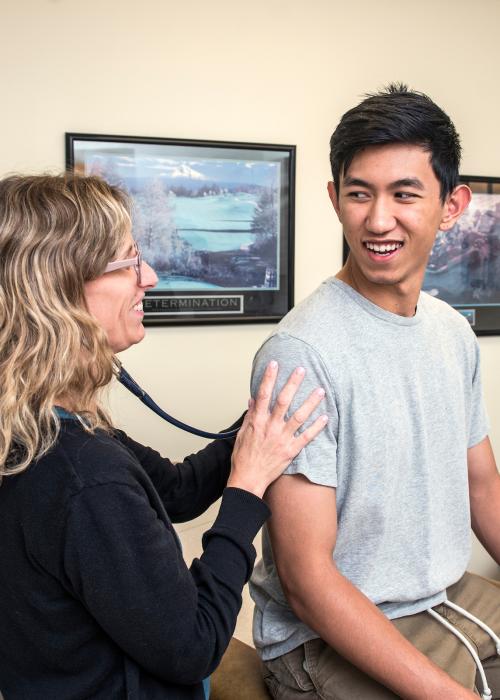
Physician Assistant
Preprofessional Studies
Work toward becoming a vital part of healthcare.
You have a passion for healing, for understanding, for science. As a
pre–physician assistant, you’ll begin your journey toward working under the supervision of a medical doctor to practice medicine and provide direct care to patients.

The details
What you need to know.
In order to become a licensed physician assistant you must meet the following criteria:
- Earn a graduate degree from a program that is accredited by the Accreditation Review Commission of Education for the Physician Assistant (typically a seven-term curriculum of medical courses and a variety of clinical rotations in healthcare settings)
- Prepare for and pass the Physician Assistant National Certifying Exam
- Fulfill any state licensure requirements are also mandatory
Note: Once you obtain a PA license, you may also choose to pursue specialty certifications with additional education.
Workplace Environment
Licensed PAs practice medicine in a variety of ways, working under the supervision of a medical doctor. There are opportunities for PAs to practice medicine at in the following areas:
- Hospitals
- Doctors’ offices
- Clinics
- Serve as a primary-care physician
- Assist in surgical procedures
Being a pre–physician assistant student does not refer to your chosen undergraduate major. Rather, it indicates that, regardless of your major, you are preparing now to apply to a graduate physician assistant program in order to pursue a career as a licensed PA. You should choose a major you are passionate about and interested in, as strong academics are important for graduate school applications. While planning your preprofessional journey, it’s important to know the following:
- No specific undergraduate major required
- Prerequisite courses required (health and physical science are common)
- Meet with the preprofessional advisor as early as possible
Note: Once you have finalized your major and academic plan, a discipline-specific faculty member may also be assigned as a pre–physician assistant mentor and guide.
In order to become a licensed physician assistant you must meet the following criteria:
- Earn a graduate degree from a program that is accredited by the Accreditation Review Commission of Education for the Physician Assistant (typically a seven-term curriculum of medical courses and a variety of clinical rotations in healthcare settings)
- Prepare for and pass the Physician Assistant National Certifying Exam
- Fulfill any state licensure requirements are also mandatory
Note: Once you obtain a PA license, you may also choose to pursue specialty certifications with additional education.
Workplace Environment
Licensed PAs practice medicine in a variety of ways, working under the supervision of a medical doctor. There are opportunities for PAs to practice medicine at in the following areas:
- Hospitals
- Doctors’ offices
- Clinics
- Serve as a primary-care physician
- Assist in surgical procedures
Being a pre–physician assistant student does not refer to your chosen undergraduate major. Rather, it indicates that, regardless of your major, you are preparing now to apply to a graduate physician assistant program in order to pursue a career as a licensed PA. You should choose a major you are passionate about and interested in, as strong academics are important for graduate school applications. While planning your preprofessional journey, it’s important to know the following:
- No specific undergraduate major required
- Prerequisite courses required (health and physical science are common)
- Meet with the preprofessional advisor as early as possible
Note: Once you have finalized your major and academic plan, a discipline-specific faculty member may also be assigned as a pre–physician assistant mentor and guide.


requirements and recommendations
What to expect from your preprofessional studies.
The following list includes some of the most common prerequisites for many of the master of physician assistant programs in the United States:
- Biology with labs
- Anatomy and physiology with labs
- General chemistry with labs
- Organic chemistry with labs
- Microbiology and/or biochemistry with labs
- General psychology
- Statistics
- Medical terminology
- English composition
- Communications
It is also important to gain direct healthcare and patient experiences through working or volunteering in a medical environment. In fact, many physician assistant program applicants have held jobs in the medical field, in addition to earning a bachelor’s degree. Pre-PA students are encouraged to begin by job-shadowing a physical assistant and to start looking for volunteer opportunities as soon as possible.
Contact us
Have questions?
Contact Marcy Ball, preprofessional advisor for health programs, at ballml@pfw.edu or 260-481-5735.
